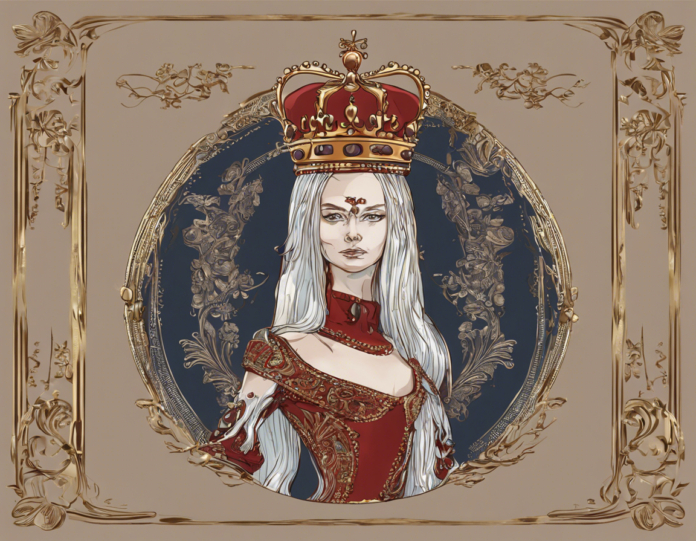Diving into the realm of royalty, one cannot help but be captivated by the grace and power exuded by a royal queen. Throughout history, queens from different cultures and time periods have left an indelible mark with their intelligence, strength, and presence. From Cleopatra of ancient Egypt to Queen Elizabeth II of the United Kingdom, these women have shaped the course of history and inspired generations with their leadership.
In this article, we will delve deep into the realm of royal queens, exploring their roles, responsibilities, challenges, and enduring legacies. We will decipher the enigmatic charm of these powerful women and uncover the secrets to their success and influence. Join us on a journey through history as we unveil the grace and power of the royal queen.
The Rise of the Royal Queens
Royal queens have existed throughout history, reigning over kingdoms, empires, and countries with a blend of elegance and authority. From medieval monarchies to modern constitutional monarchies, queens have occupied thrones alongside kings, sometimes as rulers in their own right and at other times as consorts to monarchs.
Ancient Queens
In ancient times, queens often wielded significant power and influence. Cleopatra, the last active ruler of the Ptolemaic Kingdom of Egypt, is one of the most famous queens in history. Known for her intelligence, charisma, and political acumen, Cleopatra successfully ruled Egypt and formed strategic alliances with powerful Roman leaders such as Julius Caesar and Mark Antony.
Medieval Queens
During the medieval period, queens played vital roles in the governance and diplomacy of their realms. Eleanor of Aquitaine, queen consort of France and later England, was a formidable figure known for her intellect and political savvy. She wielded considerable influence during the reigns of her husbands and sons, shaping the history of medieval Europe.
Modern Queens
In more recent times, queens have continued to make their mark on the world stage. Queen Elizabeth II of the United Kingdom, the world’s longest-reigning current monarch, has embodied duty, dedication, and resilience throughout her reign. Her reign has witnessed significant changes in the monarchy and the world at large, yet her commitment to service and tradition remains unwavering.
The Role of a Royal Queen
The role of a royal queen is multifaceted, encompassing ceremonial duties, charitable work, diplomatic engagements, and representing the monarchy to the public. Queens often serve as symbols of continuity and stability, embodying the history and traditions of their nations. While the specific responsibilities of a royal queen vary depending on the country and the type of monarchy, there are certain common aspects to their roles:
-
Ceremonial Duties: Royal queens participate in state ceremonies, official functions, and public events, projecting a sense of dignity and decorum befitting their station.
-
Charitable Work: Queens are often involved in various charitable causes and organizations, using their platform to raise awareness and support for important social issues.
-
Diplomatic Engagements: Queens play a key role in diplomatic relations, hosting foreign dignitaries, attending state visits, and promoting international cooperation.
-
Representing the Monarchy: As the public face of the monarchy, queens represent its values, traditions, and continuity, engaging with the public and fostering national unity.
The Challenges Faced by Royal Queens
Despite the glamour and prestige associated with royalty, royal queens face a unique set of challenges in navigating their roles and responsibilities. From public scrutiny to personal sacrifices, the demands of royal life can be daunting. Some of the common challenges faced by royal queens include:
-
Intense Public Scrutiny: Royal queens are constantly in the public eye, with their every move and decision subject to scrutiny and criticism.
-
Balancing Family and Duty: Queens must strike a delicate balance between their roles as monarchs, mothers, and spouses, often facing conflicting demands on their time and attention.
-
Maintaining Tradition in a Changing World: As society evolves, royal queens must adapt to new realities while upholding the traditions and customs of the monarchy.
-
Dealing with Political Pressures: Queens may find themselves caught in political controversies or disputes, requiring them to navigate delicate political situations with grace and impartiality.
The Enduring Legacy of Royal Queens
Despite the challenges they face, royal queens have left an enduring legacy that continues to inspire and captivate. From their accomplishments in diplomacy and governance to their contributions to art, culture, and philanthropy, queens have made a lasting impact on the world. Their stories serve as a reminder of the resilience, wisdom, and grace that characterize great leadership.
Diplomacy and Statecraft
Royal queens have often excelled in the realm of diplomacy, forging alliances, resolving conflicts, and promoting peace and prosperity. Queen Victoria of the United Kingdom, for example, played a key role in shaping the geopolitics of her time, earning the nickname “the grandmother of Europe” for her influence on international relations.
Cultural Patronage
Queens have long been patrons of the arts, literature, and culture, nurturing creativity and enriching the cultural life of their nations. Queen Isabella I of Castile and Queen Elizabeth I of England were renowned for their support of the arts and sciences, fostering a flourishing cultural renaissance during their reigns.
Humanitarian Work
Many royal queens have dedicated themselves to humanitarian causes, championing social justice, healthcare, and education. Queen Rania of Jordan, known for her advocacy on behalf of children and women, is a leading voice for humanitarian issues in the Middle East and beyond.
Unveiling the Secrets of Grace and Power
What sets royal queens apart and endows them with grace and power? While each queen is a unique individual with her own strengths and qualities, there are certain attributes and strategies that contribute to their success and influence. Let’s uncover some of the secrets to the grace and power of royal queens:
Resilience
Royal queens often face adversity and challenges during their reigns, yet they demonstrate remarkable resilience in the face of obstacles. Whether navigating political crises, personal tragedies, or public controversies, queens exhibit a steely determination and a refusal to be daunted by setbacks.
Empathy
Empathy is a key quality that distinguishes great leaders, including royal queens. By connecting with their people on a personal level, understanding their concerns and aspirations, queens cultivate a sense of empathy and compassion that fosters trust and loyalty among their subjects.
Diplomacy
Diplomacy is a crucial skill for royal queens, enabling them to navigate complex relationships, mediate disputes, and build bridges between nations and communities. Queens adept at the art of diplomacy can wield influence on the global stage and shape the course of history through their actions.
Vision
Royal queens with a clear vision for the future inspire confidence and direction among their people. By articulating a compelling vision of progress, prosperity, and unity, queens can mobilize support and galvanize their nations towards shared goals and aspirations.
Frequently Asked Questions (FAQs)
Q1: Can a queen rule without a king?
A queen can rule in her own right without a king, a position known as a queen regnant. Throughout history, there have been many queens regnant who have wielded sovereign power without a male counterpart.
Q2: What is the role of a queen consort?
A queen consort is the wife of a reigning king and holds a ceremonial position without inherent political power. Her role is primarily to support the king, engage in charitable work, and represent the monarchy at official functions.
Q3: How is a queen’s successor determined?
The succession to the throne is determined by the royal family’s lineage and the laws of succession specific to each monarchy. In some countries, primogeniture governs succession, while others have adopted gender-neutral succession laws.
Q4: Can a queen abdicate the throne?
Queens, like kings, have the legal right to abdicate the throne if they choose to relinquish their royal duties. Abdication typically requires a formal announcement and the ascension of a successor to the throne.
Q5: Are there any female monarchies where queens hold more power than kings?
Historically, some female monarchs have wielded more power and influence than their male counterparts. However, the degree of power and authority held by queens versus kings often depends on the specific monarch, the political context, and the culture of the monarchy.
In conclusion, royal queens embody a unique blend of grace, power, and influence that sets them apart as formidable leaders and icons of history. Their legacy transcends time and borders, inspiring admiration and fascination for generations to come. By unraveling the mysteries of their success and resilience, we gain insight into the enduring allure of the royal queen and the indelible mark she leaves on the world.









